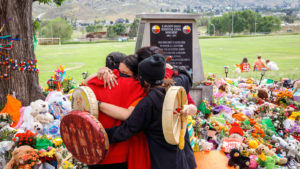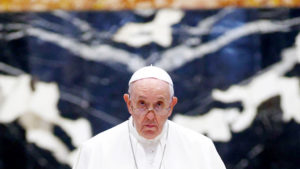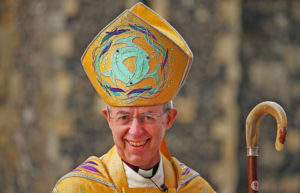Pope Francis is sorry and not sorry. Last week, he was in Canada to deliver an apology for the abuse suffered by indigenous children in schools run by the Catholic Church. He was rewarded with approving headlines — and an even better photo-opportunity involving a spectacular feather headdress. That may strike you as a cynical attitude to the Pope’s “penitential” journey. Then again, you may not be aware that, right now, Francis is protecting the interests of a sex abuser he made a bishop and then hid in the Vatican.
Under normal circumstances, it would be perfectly appropriate for the Supreme Pontiff to express shame for the persecution of pupils at the Residential Schools operated by the Church in Canada between the 1870s and 1990s. Last year, it was reported that the graves of 200 children had been found near one of these schools in British Columbia. That may be fake news. Some experts believe that the “graves” were soil disturbances and point out that they have not been excavated. No one disputes, however, that children suffered monstrously. Former pupils have talked of savage beatings and being forbidden to speak their native languages. Hundreds of sexual predators were protected.
But this pope has little moral authority to apologise for anyone else’s crimes. To understand why, we need to travel 6,500 miles from the scene of Francis’s meticulously staged expression of remorse in Edmonton to a dusty city in the subtropical north-west of Argentina. Although Orán has only 73,000 inhabitants, it does have a cathedral — a spiky concrete tent that embarrasses even the local tourist board.
Shortly after becoming pope, Francis made his friend Father Gustavo Zanchetta the Bishop of Orán. Zanchetta, then aged only 49, had been a protégé of Francis, then known as Jorge Mario Bergoglio, Archbishop of Buenos Aires. As an official of the Argentine bishops’ conference, Zanchetta knew that if you were an ally of Cardinal Bergoglio, he could turn a blind eye to just about anything. (For example, in 2009 Fr Julio Grassi, who ran homes for Argentinian street children, was sentenced to 15 years in jail for sexually assaulting minors. In what could be seen as an attempt to have the conviction crushed, Bergoglio authorised a report that trashed Grassi’s accusers.)
The news that Francis was making Zanchetta a bishop horrified the priest’s critics in his home diocese of Quilmes. Two years earlier, Dr Santiago Spadafora, former adviser to the diocese, had complained to Cardinal Bergoglio about Zanchetta’s financial incompetence and “abuse of power” as the diocesan Vicar for Economic Affairs. Spadafora says Bergoglio rang him promising to examine “in detail” the supporting documents he had sent him. Nothing happened. When the new Pope announced that his protégé would be given a mitre, Spadafora started a change.org petition, signed by 100 lay employees from schools administered by Zanchetta, asking Francis to review the appointment. It was ignored.
Gustavo Zanchetta resigned as Bishop of Orán in 2017, less than four years after taking over — and a mere 22 years before he was due to retire — citing unspecified “health reasons”. According to the Italian newspaper La Stampa, he then left the diocese in a “furtive, unexpected flight without even a minimal farewell”.
It turned out that Zanchetta had every reason to act furtively. In 2015, he was reported to have saved pornographic photographs of himself and “young people” on his mobile phone. There were also complaints — fully justified, as it turned out — that he was sexually harassing seminarians. As The Pillar and numerous other Catholic news websites have reported, Pope Francis knew about the complaints and saw the photographs. But he claimed to believe Zanchetta’s explanation that his phone had been hacked.
The Pope met Bishop Zanchetta in Rome and then sent him back to his diocese. Senior priests of the diocese of Orán were so disgusted that they launched a complaint with the papal nuncio in Buenos Aires. Yet, when Zanchetta finally resigned in 2017, the Vatican insisted that it had never received “formal complaints” about the bishop. That was not true.
In 2018, Francis sent his friend to Spain for “therapy”, presumably to address his alleged (and since proven) sexual predation. As for the many stories of financial wrongdoing, the Pope wasn’t worried. He promptly created a new job inside the Vatican for Zanchetta — as “assessor” at the Administration of the Patrimony of the Holy See (APSA), which manages the Vatican’s property, financial and liquid assets. As they say in Rome, Vos non potestis facere eum. You couldn’t make it up.
In June 2019, Argentine prosecutors charged Bishop Zanchetta with sexually abusing two seminarians. In November that year, police raided his former headquarters in Orán, looking for evidence of fraud against the state. As Inés San Martin, a widely respected Argentinian Vatican correspondent, reported at the time: “Public records show that Zanchetta received over one million pesos, close to $250,000 at the time, from the provincial government for the restoration of a parish rectory and for a series of lectures in the local seminary that never took place.
“Zanchetta has also been accused of mismanaging church funds donated by the faithful and of keeping the sale of a Church-owned property off the books; the funds raised through the sale remain unaccounted for.”
For a time Zanchetta had to step down from his job “assessing” Vatican finances. Then Francis let him go back to work. But in March this year his career was finally brought to an end when he was sentenced to four and a half years in an Argentine prison — after he was found guilty of those charges of sexual abuse.
On the day of the sentencing, journalist Silvia Noviasky of El Tribuno said on Twitter that relatives and friends of seminarians were crying outside the court because the sentence against Zanchetta “was very little for the damage he did”. That’s putting it mildly. Zanchetta didn’t end up in jail. He is being allowed to serve his time in a monastery, because prison might exacerbate his high blood pressure. And now there has been yet another troubling twist to his story.
When it was clear that Zanchetta was heading for a prison sentence, the Vatican finally conducted a canonical investigation into his behaviour, to see what penalties he might have incurred under church law. The proceedings were kept secret. The Argentine court asked to see the findings and was ignored. Now, to quote the veteran Vatican correspondent Christopher Altieri:
“Pope Francis has sent the canon lawyer who represented his friend and former colleague Gustavo Zanchetta (a convicted sex offender serving time in prison), to investigate some of the very clerics who denounced their erstwhile bishop to the Vatican and testified against him”.
Dr Javier Belda Iniesta, who defended Zanchetta in a process whose outcome was never revealed, is now investigating the people who blew the whistle on this abuser.
While the Vatican press corps drool over Francis’s Canadian adventure, many Catholics in Orán are ready to burn him in effigy. They know they’ll never get the chance to confront him in person: not once since becoming Pope has Francis set foot in his home country. But they can talk to the press.
One of Zanchetta’s victims gave an interview to Silvia Noviasky last week. Conveniently for the Vatican, it hasn’t appeared in English until now. M.C., a seminarian who was abused by Zanchetta, said he could hardly sleep because he was so distressed by the decision to put him under house arrest. “I think the judges didn’t take into account the psychological report on him as a manipulator, someone who doesn’t see reality as it is but the way he wants it,” he told Noviasky. “He’s been granted house arrest in a religious house which is frequented by those who are vulnerable.”
According to M.C., Zanchetta is able to call in favours in Orán, “a small town where we know each other or know each other’s secrets”. He’s furious that Zanchetta hasn’t been defrocked and retains the title of bishop. Noviasky asked him why that was. He replied: “Because there are a lot of favours doled out and cronyism and it all comes from Pope Francis, who currently says some things in his sermons and does different ones.”
Needless to say, none of the Vatican correspondents on the flight back from Canada seem to have asked Francis about the latest sinister developments in Orán. If they had, it may well have been their last trip on the papal plane. No more photos of themselves hobnobbing with the Holy Father that they can post on Twitter.
And so we’re no closer to answering the most baffling question of all. Why on Earth is Francis — not for the first time — taking risks to protect a convicted sex offender?
Disclaimer
Some of the posts we share are controversial and we do not necessarily agree with them in the whole extend. Sometimes we agree with the content or part of it but we do not agree with the narration or language. Nevertheless we find them somehow interesting, valuable and/or informative or we share them, because we strongly believe in freedom of speech, free press and journalism. We strongly encourage you to have a critical approach to all the content, do your own research and analysis to build your own opinion.
We would be glad to have your feedback.
Source: UnHerd Read the original article here: https://unherd.com/




